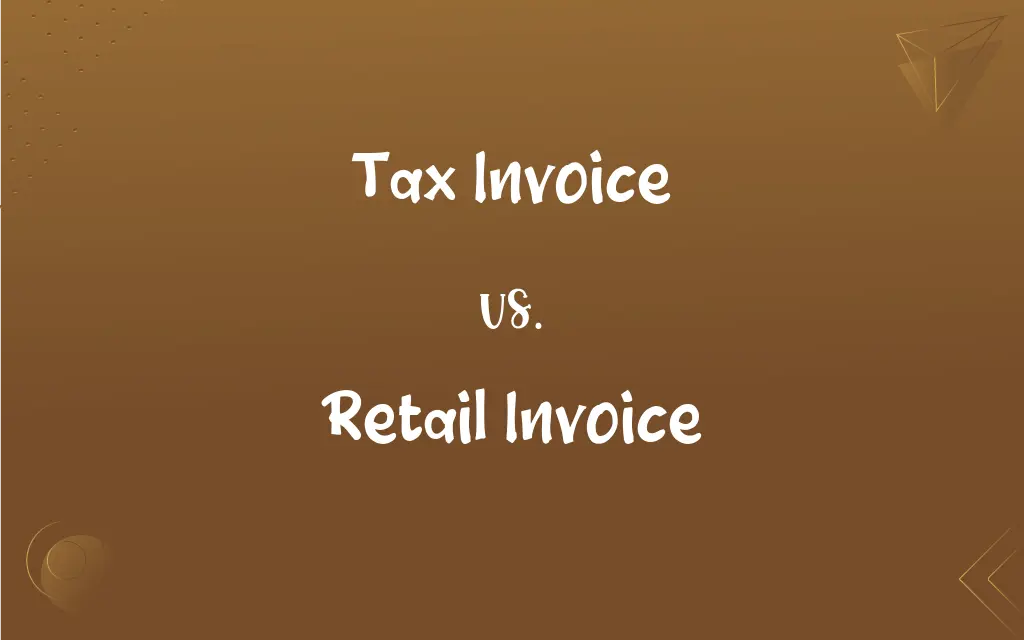Tax Invoice vs. Retail Invoice: What's the Difference?
Edited by Harlon Moss || By Janet White || Published on December 23, 2023
Tax Invoice is a document issued by a registered dealer to the buyer, detailing the tax charged on sold goods or services. Retail Invoice is a receipt issued in a retail transaction, showing the sale of goods directly to the end consumer.

Key Differences
A tax invoice is primarily used in business-to-business transactions and is essential for claiming tax credits. It typically includes detailed tax information. In contrast, a retail invoice is commonly used in business-to-consumer sales and focuses on the final sale price without explicitly detailing the tax components.
In a tax invoice, the emphasis is on tax compliance, including the breakdown of taxes like VAT or GST. This makes it crucial for businesses for accounting purposes. A retail invoice, however, is more a proof of purchase for the consumer, showing the total amount paid including taxes, but not necessarily breaking down the tax amounts.
Tax invoices must contain specific information like the tax registration number of the seller, making them more detailed and formal. Retail invoices are simpler, often just listing the items purchased, their prices, and the total amount, including a lump sum tax if applicable.
Businesses issue tax invoices to track sales and tax liability, serving as a key document for tax authorities. Retail invoices serve more as a transaction record for the consumer, useful for returns, warranties, or personal record-keeping.
The issuance of a tax invoice is a legal requirement in many jurisdictions for registered dealers or businesses. In contrast, a retail invoice is a standard business practice in retail, but its format and details are less regulated.
ADVERTISEMENT
Comparison Chart
Usage
Used in B2B transactions
Used in B2C transactions
Tax Details
Detailed tax breakdown
Total amount including a lump sum tax
Legal Requirements
Required for tax compliance and credit claims
Less regulated, serves as proof of purchase
Information Included
Tax registration number, itemized tax
List of items, total price, possibly including overall tax
Primary Purpose
For accounting and legal compliance
For consumer's record of purchase
ADVERTISEMENT
Tax Invoice and Retail Invoice Definitions
Tax Invoice
A legally required document in B2B sales.
They issued a tax invoice for the wholesale transaction.
Retail Invoice
A non-itemized tax summary for consumer sales.
His retail invoice showed a total amount, including tax.
Tax Invoice
A business invoice with detailed tax information.
The tax invoice was necessary for their financial records.
Retail Invoice
A proof of purchase in retail shopping.
The customer kept the retail invoice for warranty purposes.
Tax Invoice
A document detailing taxes on a sale.
The company sent a tax invoice for the services rendered.
Retail Invoice
A simple record of a retail purchase.
The retail invoice included the price of each item bought.
Tax Invoice
An invoice used for claiming tax credits.
He received a tax invoice for his business purchase.
Retail Invoice
An invoice in a direct consumer transaction.
The retail store issued a retail invoice for the electronics sold.
Tax Invoice
A formal record of a taxable transaction.
The tax invoice listed all applicable GST charges.
Retail Invoice
A receipt for a sale to an end consumer.
She received a retail invoice for her clothing purchase.
FAQs
What is a tax invoice?
A tax invoice is a detailed document issued in business transactions, showing taxes on sold goods or services.
Can individuals receive a tax invoice?
Individuals usually receive a tax invoice when involved in transactions where tax documentation is necessary.
What is a retail invoice?
A retail invoice is a receipt showing the sale of goods or services directly to the end consumer.
How does a tax invoice support tax compliance?
Tax invoices provide a detailed record of taxable transactions, supporting accurate tax filings and compliance.
When is a tax invoice required?
A tax invoice is required in B2B transactions for tax compliance and claiming tax credits.
Are tax invoices necessary for all businesses?
Tax invoices are necessary for registered businesses involved in taxable sales.
What details are included in a retail invoice?
A retail invoice includes items sold, their prices, and the total amount, sometimes with a lump sum tax.
Is a retail invoice sufficient for tax claims?
Retail invoices typically do not contain detailed tax information required for tax claims.
What legal importance does a tax invoice have?
Tax invoices are legally important for accounting, tax compliance, and audits.
Can a retail invoice be used for warranty claims?
Yes, retail invoices are often used as proof of purchase for returns or warranty claims.
Why might a consumer need a retail invoice?
Consumers need retail invoices for proof of purchase, returns, exchanges, or warranty claims.
Does a retail invoice show each tax separately?
Generally, retail invoices do not itemize taxes but include them in the total price.
Is GST or VAT always shown on a tax invoice?
GST, VAT, or relevant taxes are typically itemized on a tax invoice.
What is the primary difference in the purpose of these invoices?
The primary difference is that tax invoices are for tax compliance in business transactions, while retail invoices serve as purchase proof for consumers.
Who issues a tax invoice?
Registered dealers or businesses issue tax invoices in taxable sales transactions.
Are digital retail invoices valid?
Yes, digital retail invoices are valid and commonly used in online transactions.
Can a retail invoice be amended?
Retail invoices can be amended or reissued, usually in cases of error or returns.
Do tax invoices impact tax audits?
Yes, tax invoices are crucial documents reviewed during tax audits.
Can a retail invoice be used for business accounting?
Retail invoices can be used for accounting, but they may lack detailed tax information for tax purposes.
What happens if a tax invoice is not issued when required?
Not issuing a required tax invoice can lead to legal issues and penalties for tax non-compliance.
About Author
Written by
Janet WhiteJanet White has been an esteemed writer and blogger for Difference Wiki. Holding a Master's degree in Science and Medical Journalism from the prestigious Boston University, she has consistently demonstrated her expertise and passion for her field. When she's not immersed in her work, Janet relishes her time exercising, delving into a good book, and cherishing moments with friends and family.
Edited by
Harlon MossHarlon is a seasoned quality moderator and accomplished content writer for Difference Wiki. An alumnus of the prestigious University of California, he earned his degree in Computer Science. Leveraging his academic background, Harlon brings a meticulous and informed perspective to his work, ensuring content accuracy and excellence.






































































